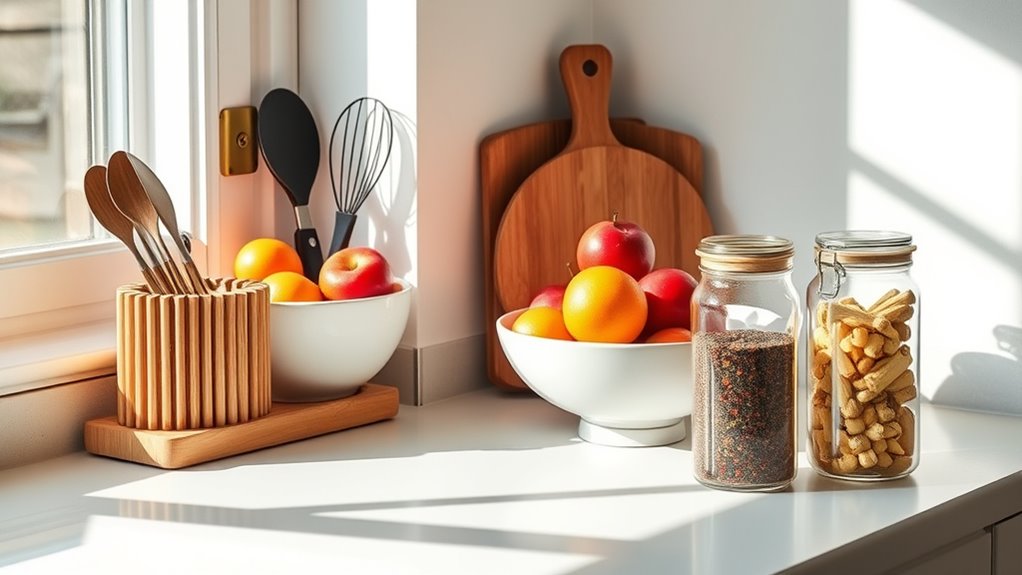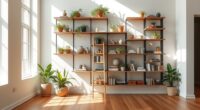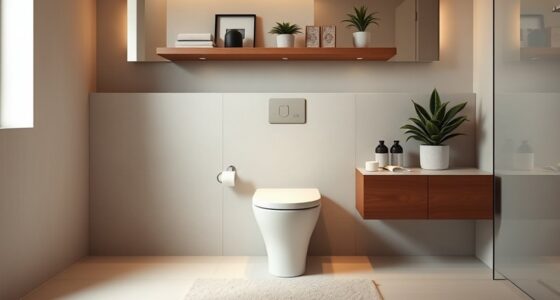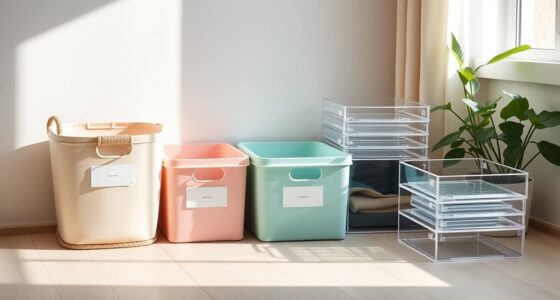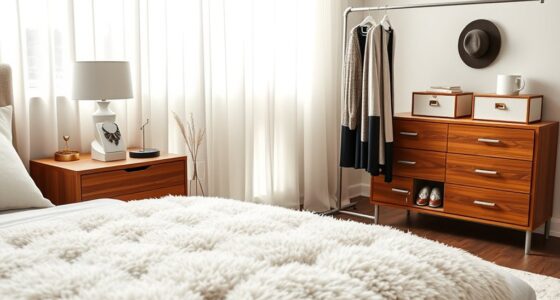I've found three decluttering resources that really transform daily routines. First, *The Sentimental Person's Guide to Decluttering* is perfect for emotional attachments. Second, *Decluttering Advice: Easy Ways to Reduce Stress* provides practical tips for overwhelmed folks. Finally, *Pure Simplicity: The Art of Minimalism* promotes mindfulness for a calmer life. Each offers unique insights to simplify your space and enhance clarity. Stick around, and you'll uncover even more strategies to declutter effectively!
Key Takeaways
- Multifunctional storage solutions, like ottomans or coffee tables with hidden compartments, maximize space and reduce clutter in daily routines.
- Implement a "keep, donate, discard" method to quickly categorize belongings, making decision-making streamlined and efficient.
- Regularly evaluate frequently used items to maintain only essentials, enhancing clarity and productivity in your living space.
- Take photos of sentimental items to preserve memories while reducing physical clutter, allowing for emotional detachment.
- Engage with a community focused on minimalism for ongoing support and motivation to sustain decluttering efforts long-term.
The Sentimental Persons Guide to Decluttering
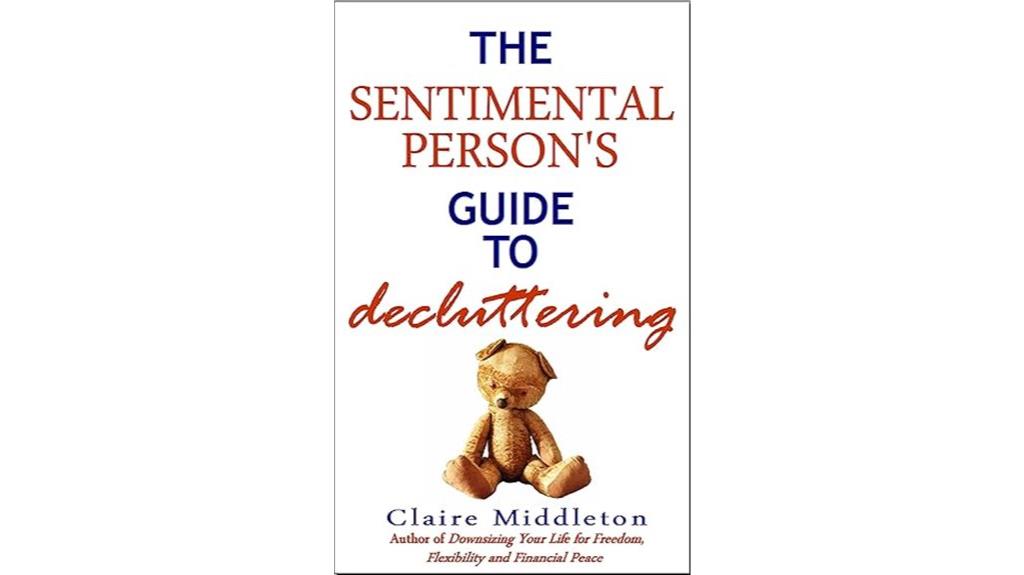
If you're someone who finds it difficult to part with belongings due to their sentimental value, *The Sentimental Persons Guide to Decluttering* is the perfect choice for you. This book offers practical strategies that really helped me tackle my clutter without feeling overwhelmed. Instead of sorting room-by-room, I learned to group similar items together, making the process more manageable. The author addresses the emotional challenges we face, reminding us that gifts shouldn't become obligations. I found comfort in the motivational tone, which encouraged me to reflect on my attachments, ultimately helping me regain control over my belongings and embrace a minimalist lifestyle.
Best For: Individuals who struggle to declutter due to sentimental attachments and seek practical guidance to manage their belongings.
Pros:
- Encourages grouping similar items together for a more effective decluttering process.
- Addresses emotional challenges related to letting go of possessions, helping readers overcome guilt.
- Offers straightforward advice and a motivational tone that inspires gradual progress towards a minimalist lifestyle.
Cons:
- Some information may feel basic for individuals already familiar with decluttering techniques.
- Emotional challenges may still linger for some readers, making the process difficult despite the guidance.
- The focus on sentimentality may not resonate with individuals who approach decluttering purely from a practical standpoint.
Decluttering Advice: Easy Ways to Reduce Stress and Declutter Your Home

For anyone feeling overwhelmed by clutter and seeking a more organized life, "Decluttering Advice: Easy Ways to Reduce Stress and Declutter Your Home" is an invaluable resource. Lisa Hedberg's practical tips, like tackling one room at a time and using the Command-Z Solution, helped me make clear decisions about what to keep or discard. I loved how she addresses the emotional ties we have to our belongings, giving me permission to let go without guilt. This book not only motivated me but also provided a structured approach, making my decluttering journey feel achievable and stress-free. You'll find it empowering!
Best For: Individuals feeling overwhelmed by clutter who seek a structured and supportive approach to decluttering their home.
Pros:
- Offers practical tips and structured techniques like the Command-Z Solution.
- Addresses emotional attachments to belongings, allowing readers to let go without guilt.
- Provides motivation and a sense of empowerment throughout the decluttering process.
Cons:
- Some readers find the narrative style more detailed than they prefer for quick solutions.
- The format may benefit from bullet points and visual aids for easier reference.
- A focus on introspection may not appeal to those looking for straightforward, rapid decluttering methods.
Pure Simplicity: The Art of Minimalism
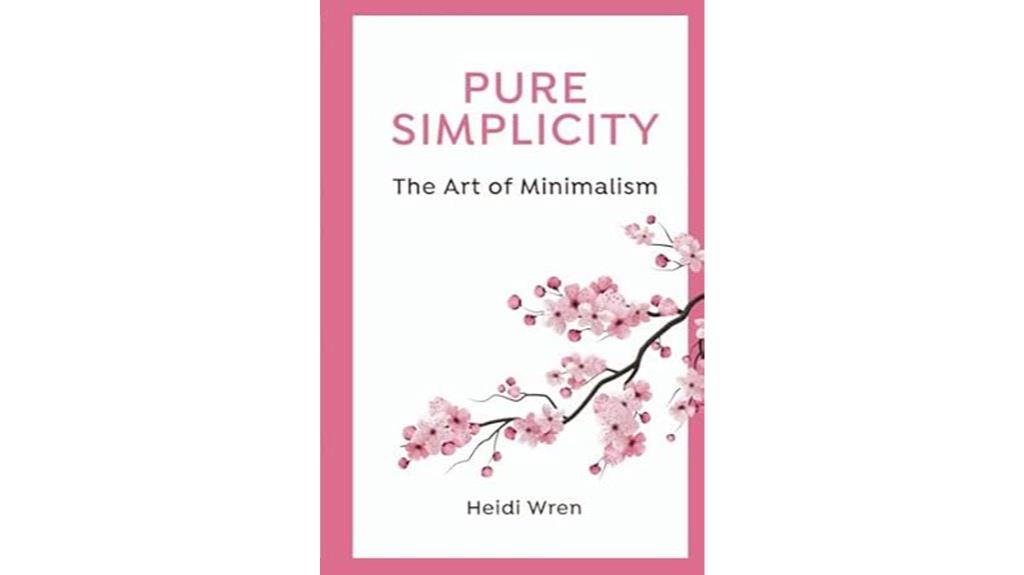
Embracing the principles outlined in "Pure Simplicity: The Art of Minimalism" can be a game changer for anyone feeling overwhelmed by clutter, whether physical or mental. This book opened my eyes to the freedom of minimalism, helping me prioritize what truly matters. It offers practical strategies for decluttering not just my home, but also my mind. The actionable checklists made it easy to start small, and I noticed meaningful changes in my daily routine. By fostering mindfulness and eliminating negative self-talk, I've transformed my life. If you're ready for a simpler existence, I highly recommend diving into this insightful guide.
Best For: Anyone seeking to simplify their life and reduce clutter, both physically and mentally, through practical minimalism strategies.
Pros:
- Offers actionable checklists that make it easy to implement minimalism in daily life.
- Encourages mindfulness and mental decluttering, promoting overall well-being.
- Highly accessible and suitable for both beginners and experienced minimalists.
Cons:
- Some readers may find the minimalist lifestyle too challenging to fully adopt.
- The emphasis on starting small may feel slow for those seeking immediate results.
- Certain concepts may not resonate with individuals deeply attached to their belongings.
Factors to Consider When Choosing These Decluttering Finds That Will Simplify Your Day
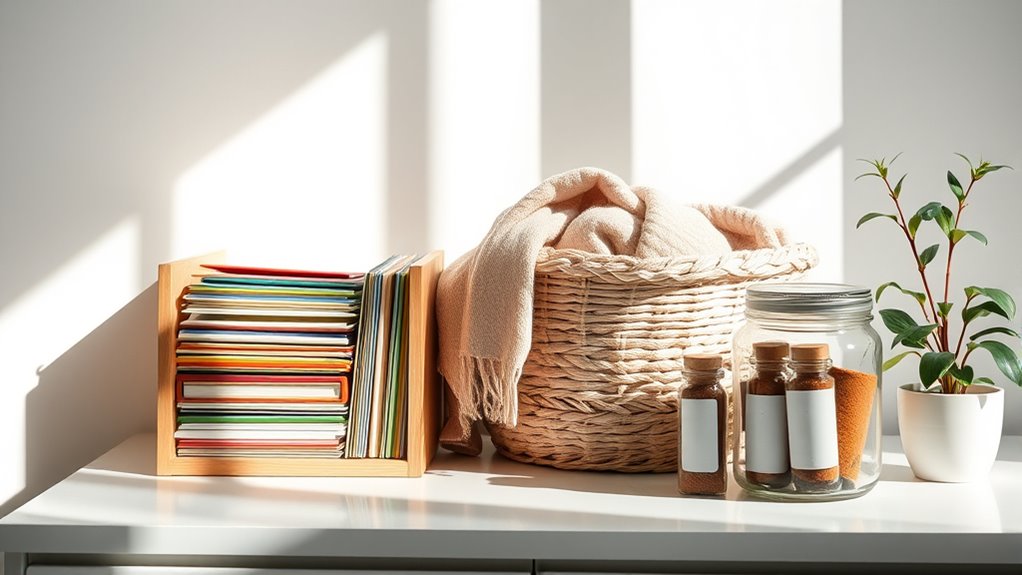
When I choose decluttering finds, I always think about how they'll fit into my life. It's crucial to reflect on my personal attachments, the space I have, and how practical each item will be. By focusing on these factors, I can guarantee that my choices truly simplify my day.
Personal Attachment Assessment
How do you decide what to keep and what to let go when decluttering? I find it helpful to assess my emotional attachment to items. I reflect on their significance and the memories tied to them. It's common to feel guilty about discarding gifts or inherited items, but I remind myself that these possessions don't define my relationships. Using a "keep, donate, discard" method makes it easier to categorize items based on their emotional value and practical use. I also take photos of sentimental items, preserving memories without clutter. Regularly evaluating my belongings helps me determine if each item still serves a purpose or brings joy, preventing unnecessary accumulation in the future.
Space Availability Evaluation
Understanding the space you have available is essential for effective decluttering. I always start by evaluating the total square footage of my living area—this helps me determine how much room I have for storage and organization. I consider the layout too; looking at the flow of movement in my home allows me to identify areas that could benefit from decluttering. I evaluate each room's current use and spot underutilized spaces, which helps me decide what's essential. The number of people living with me also matters, as shared spaces need a collaborative decluttering approach. Finally, I reflect on my lifestyle to guarantee my available space supports my daily routines and contributes to a more organized environment.
Practicality and Functionality
Choosing the right decluttering finds can make a significant difference in simplifying your daily routine. I always prioritize items that serve a clear purpose in my life, ensuring they enhance functionality while reducing clutter. Multifunctional storage solutions are a must; they maximize space and cut down on the need for multiple products. Ease of access is also essential; effective tools should let me quickly find and put away items to keep my environment orderly. I evaluate the durability and quality of each product, knowing that sturdy solutions prevent frequent replacements. Finally, I look for items that are easy to clean and maintain, as practical solutions should simplify my space without adding to my upkeep.
Emotional Impact Consideration
While decluttering, I often find that emotional attachments to my possessions can complicate the process. It's tough to let go of items tied to memories, like gifts or family heirlooms, without feeling guilt or anxiety. Acknowledging these feelings is crucial; it helps me confront the underlying reasons for keeping certain things. I've learned to differentiate between sentimental value and actual utility, which guides my decisions. By recognizing that holding onto every sentimental item can hinder my progress, I feel empowered to let go of what no longer serves me. This process not only brings relief but also allows me to create a more mindful environment, making it easier to choose what truly matters in my daily life.
Long-Term Sustainability Factors
Letting go of items can be liberating, but I've realized that maintaining a clutter-free space goes beyond just the initial decluttering effort. Adopting a mindset focused on mindful consumption is key to long-term sustainability. I often reflect on the 80/20 rule—recognizing that 20% of my belongings are used 80% of the time helps me prioritize what truly matters. Regularly revisiting decluttered areas keeps me organized and prevents clutter from creeping back in. I've also learned that emotional resilience is essential; detaching from items reduces guilt and fosters a healthier relationship with my possessions. Building a community around minimalism has been invaluable too, as it keeps me accountable and motivated to maintain sustainable decluttering habits.
Cost-Effectiveness Analysis
When I evaluate the cost-effectiveness of my decluttering finds, I focus on how they simplify my daily life while saving money in the long run. I consider potential savings from reduced storage costs and fewer organizational tools needed. Investing in decluttering resources often prevents future clutter, which can lead to extra expenses for organizing. I also analyze the time I spend decluttering versus the benefits, like improved mental clarity and productivity. The emotional relief I gain from a neater space can even reduce stress-related healthcare costs. Ultimately, I think about opportunity costs, like the time lost searching for items, which highlights how clutter impacts both my finances and quality of life.
Frequently Asked Questions
How Do I Start Decluttering if I'm Overwhelmed?
When I feel overwhelmed by clutter, I start small. I pick one area, like a drawer or a shelf, and set a timer for just ten minutes. I focus on sorting through items, deciding what to keep, donate, or toss. It helps to visualize my goal—a clean, organized space. Breaking it down into manageable chunks makes the process less intimidating. Before I know it, I've made a significant dent in the clutter!
What Are the Best Storage Solutions for Small Spaces?
Think of your small space like a puzzle; every piece needs to fit just right. For storage solutions, I've found vertical shelving works wonders, utilizing wall space effectively. Baskets and bins help keep items organized and visually appealing. Under-bed storage is a game-changer, too! I also love multi-functional furniture, like ottomans with hidden compartments. It's amazing how these clever solutions can transform chaos into order, making my space feel so much larger.
Can Decluttering Improve My Mental Health?
Absolutely, decluttering can greatly improve your mental health! I've felt lighter and more focused after clearing out unnecessary items from my space. When I organize my environment, I notice a boost in my mood and productivity. It's like creating a fresh canvas that helps me think clearly. Plus, the sense of accomplishment from tidying up brings me joy. So, if you're feeling overwhelmed, try decluttering; it might just work wonders for you!
How Often Should I Declutter My Home?
Imagine walking into a serene, clutter-free space where your mind can breathe. I've found that decluttering my home every few months keeps my environment feeling fresh and organized. However, I also tackle small areas weekly, like my desk or closets, to prevent overwhelm. It's all about finding a rhythm that works for me. Regularly evaluating what I truly need helps me maintain a peaceful atmosphere and boosts my overall well-being.
What Items Should I Avoid Decluttering?
When it comes to decluttering, I've learned to avoid getting rid of items that hold significant sentimental value or are essential for daily living. I keep meaningful gifts, family heirlooms, and items that spark joy. Also, I don't touch things that have practical uses, like tools or kitchen gadgets I use regularly. It's about finding a balance—letting go of what doesn't serve me while holding onto what truly matters.
Conclusion
Incorporating these decluttering finds into my daily routine has been a game-changer, like finding the perfect key that opens a hidden treasure chest of peace and clarity. By embracing simplicity, I've reduced stress and created a more organized space that reflects my true self. Remember, decluttering isn't just about getting rid of things; it's about making room for what truly matters. So go ahead, give these tips a try and watch your life transform!
